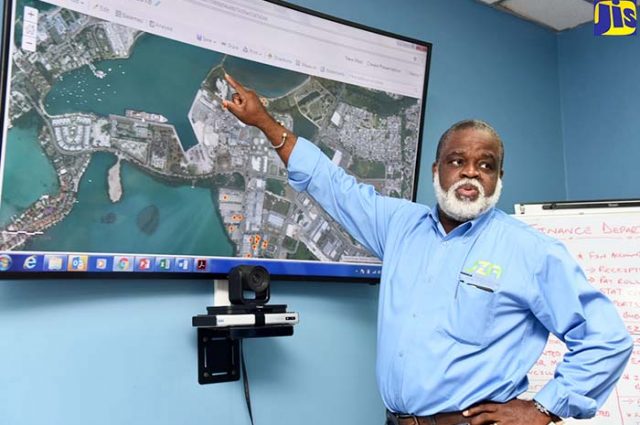Value-Added Logistics Will Drive Growth – Dr. Deans
Photo: Michael Sloley
Chief Executive Officer, Jamaica Special Economic Zone Authority, Dr. Eric Deans, pointing out several areas of Special Economic Zone operations.
Chief Executive Officer (CEO) of the Jamaica Special Economic Zone Authority (JSEZA), Dr. Eric Deans, says the development and delivery of value-added goods and services under the Government’s Logistics Hub Initiative (LHI) will be pivotal in spurring higher levels of economic growth and job creation for Jamaica.
He notes that fluctuations in the country’s economic fortunes over the years, which have primarily been based on the out-turns from agriculture, tourism and export of minerals, principally bauxite, mean that “we have to do something different in order to really get sustainable economic growth”.
He points out that the LHI encompasses a wide range of industries, incorporating diverse products and services such as business process outsourcing (BPO); product assembly, manufacturing and distribution; and logistics and shipping.
Additionally, he says there is stakeholder interest from a wide cross section of new and emerging industries, particularly in the logistics and maritime sectors.
Dr. Deans points out, however, that where Jamaica can and will potentially start to generate significant economic benefits is by “going up the value chain”.
He cites, as an example, work to upstream activities in JISCO Alpart’s industrial park in Nain, St. Elizabeth.
The CEO notes that JISCO, which will be diversifying from solely exporting bauxite and alumina into manufacturing products, will benefit from the incentive regime offered under the Special Economic Zones (SEZ) framework, which is a key component of the LHI.
“So, you will see in that JISCO industrial park… activities for manufacturing a wide range of products for automobiles and construction and by-products such as aluminium foil, window frames, roofing materials, panels… engineered aluminium casings for your cell phones and iPads… and a wide range of other items, the value of (which) is so much higher than raw aluminium,” he outlines.
Dr. Deans also points to value-added inputs for products brought in by entities utilising Jamaica as a transhipment point for distribution to the wider Caribbean, noting the benefits are afforded to them under the SEZ framework in particular.
“With the SEZs, we will see companies doing things like assembly in the zones. So what that means, for example, is that containers brought to Jamaica will go into the SEZs for additional inputs to take place on the cargo, for which locals will be employed, before being shipped out,” he tells JIS News.
The CEO cites, as an example, the packaging of instructional manuals in the relevant language for products such as appliances and electronics.
He further cites prospects in areas such as product design incorporating 3-D technology that “will enable us to do higher-income-earning activities”.
“To have those types of activities being done, where the country earns more money… and our local people gain employment (and) start to earn more money that remains in the country, is what will lead to significant economic growth,” Dr. Deans maintains.
The JSEZA is spearheading the LHI’s development, aimed at positioning Jamaica to become the fourth node in the global logistics supply chain network, thereby joining Dubai, United Arab Emirates; Rotterdam, the Netherlands and Singapore.
Logistics relates to the management of supply chains and the means by which goods and services are conveyed from the point of origin and delivered to target clients/consumers.
A logistics hub comprises a group or concentration of entities that perform this function.




